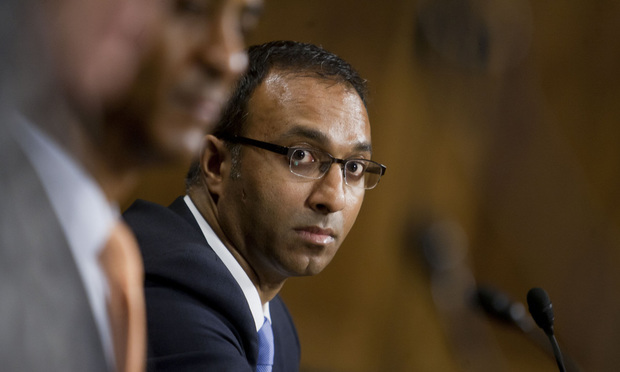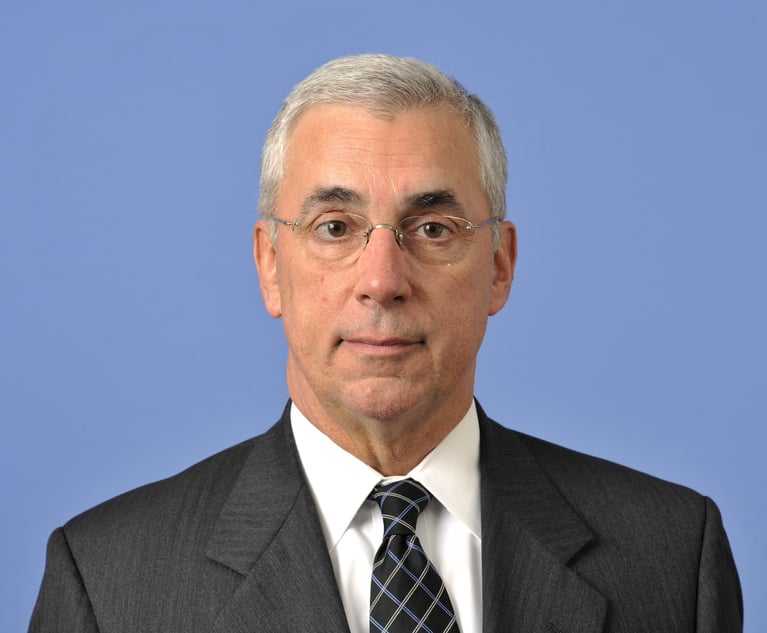Judge Grills Trump Lawyer in House Subpoena Fight for Financial Docs
Tuesday's hearing before U.S. District Judge Amit Mehta marks the first major courtroom test in the continued standoff between the president and Democratic lawmakers.
May 14, 2019 at 12:50 PM
4 minute read
 Amit Mehta, during his confirmation hearing before the Senate Judiciary Committee to be U.S. district judge for the District of Columbia. Sept. 17, 2014. Photo: Diego M. Radzinschi/ALM
Amit Mehta, during his confirmation hearing before the Senate Judiciary Committee to be U.S. district judge for the District of Columbia. Sept. 17, 2014. Photo: Diego M. Radzinschi/ALM
A Washington federal judge had pointed questions for Donald Trump's attorneys Tuesday, as he mulled whether the president's longtime accounting firm must turn over eight years of financial records in response to a U.S. House Oversight Committee subpoena.
The hearing before U.S. District Judge Amit Mehta of the District of Columbia marks the first major courtroom test in the continued standoff between the president and Democratic lawmakers after the Trump administration resisted a spate of oversight demands from Congress.
Trump's attorney, William Consovoy, argued the subpoena at the center of the case, issued last month by House Oversight chairman Rep. Elijah Cummings, is unlawful because it was not tied to a legislative purpose. Consovoy said Tuesday the congressional investigation instead veered into what was essentially a law enforcement function.
But Mehta appeared skeptical of Consovoy's argument at times, and spent the early part of the hearing grilling the lawyer on some of the reasons Congress has cited as a basis for seeking Trump's past financial statements, including determining whether Trump has violated federal ethics laws or the constitution's emoluments clauses.
At one point, Mehta even asked Consovoy whether he believed congressional investigations related to Whitewater and Watergate were valid. Consovoy didn't directly answer the question, noting he would have to look at those examples more carefully.
Mehta asked Consovoy if he was “at the end of the day” asking the court to get behind “facially acceptable purposes” for congressional demands to look into Congress' motives. Mehta suggested courts can't do that so long as Congress asserts a facially plausible and legislative basis. “That's really the end of the court's inquiry, right?” Mehta asked.
Consovoy replied that he wasn't asking the court to look into Congress' “secret motives,” but to consider lawmakers' statements and letters related to the probe. Doing so, he argued, would make clear that Congress' goal was finding examples of wrongdoing by Trump, rather than advancing any legislation.
U.S. House lawyer Douglas Letter argued that courts have long recognized Congress' broad investigative authority. He also fielded tough questioning from Mehta, who asked whether there are limits to the scope of what Congress is able to investigate when it comes to the president.
The judge noted “there are no ordinary lines here” that the court could look to to test the validity of House Oversight's actions.
“We have an obviously legitimate purpose,” Letter said Tuesday. He agreed there were some limits, noting it would be a stretch to, for example, probe the president's “totally personal life” or subpoena a diary he had when he was 12 years old.
Mehta also asked Letter about the relevance of investigating potentially illegal conduct from Trump before he took office. Letter replied that Trump had ongoing financial activities and business relationships. Congress must know whether the president has potential conflicts of interest and whether foreign governments could potentially exercise control over him because they knew he was in violation of the law, Letter said.
Mazars, represented by the law firm Blank Rome, is not taking a legal position in the case.
Read more:
William Consovoy, Stefan Passantino Lead Trump Suit Fighting House Subpoena
Roberts Scolds Solicitor General Over Wasting 'Hard-Working' Judges' Time
Former DOJ National Security Chief Joins Wiggin and Dana
Prosecutors Reveal Why They Want Sidley's James Cole Disqualified in Huawei Case
This content has been archived. It is available through our partners, LexisNexis® and Bloomberg Law.
To view this content, please continue to their sites.
Not a Lexis Subscriber?
Subscribe Now
Not a Bloomberg Law Subscriber?
Subscribe Now
NOT FOR REPRINT
© 2025 ALM Global, LLC, All Rights Reserved. Request academic re-use from www.copyright.com. All other uses, submit a request to [email protected]. For more information visit Asset & Logo Licensing.
You Might Like
View All
Dissenter Blasts 4th Circuit Majority Decision Upholding Meta's Section 230 Defense
5 minute read
Justice 'Weaponization Working Group' Will Examine Officials Who Investigated Trump, US AG Bondi Says

Judge Pauses Deadline for Federal Workers to Accept Trump Resignation Offer

Judge Accuses Trump of Constitutional End Run, Blocks Citizenship Order
3 minute readTrending Stories
- 1States Accuse Trump of Thwarting Court's Funding Restoration Order
- 2Microsoft Becomes Latest Tech Company to Face Claims of Stealing Marketing Commissions From Influencers
- 3Coral Gables Attorney Busted for Stalking Lawyer
- 4Trump's DOJ Delays Releasing Jan. 6 FBI Agents List Under Consent Order
- 5Securities Report Says That 2024 Settlements Passed a Total of $5.2B
Who Got The Work
J. Brugh Lower of Gibbons has entered an appearance for industrial equipment supplier Devco Corporation in a pending trademark infringement lawsuit. The suit, accusing the defendant of selling knock-off Graco products, was filed Dec. 18 in New Jersey District Court by Rivkin Radler on behalf of Graco Inc. and Graco Minnesota. The case, assigned to U.S. District Judge Zahid N. Quraishi, is 3:24-cv-11294, Graco Inc. et al v. Devco Corporation.
Who Got The Work
Rebecca Maller-Stein and Kent A. Yalowitz of Arnold & Porter Kaye Scholer have entered their appearances for Hanaco Venture Capital and its executives, Lior Prosor and David Frankel, in a pending securities lawsuit. The action, filed on Dec. 24 in New York Southern District Court by Zell, Aron & Co. on behalf of Goldeneye Advisors, accuses the defendants of negligently and fraudulently managing the plaintiff's $1 million investment. The case, assigned to U.S. District Judge Vernon S. Broderick, is 1:24-cv-09918, Goldeneye Advisors, LLC v. Hanaco Venture Capital, Ltd. et al.
Who Got The Work
Attorneys from A&O Shearman has stepped in as defense counsel for Toronto-Dominion Bank and other defendants in a pending securities class action. The suit, filed Dec. 11 in New York Southern District Court by Bleichmar Fonti & Auld, accuses the defendants of concealing the bank's 'pervasive' deficiencies in regards to its compliance with the Bank Secrecy Act and the quality of its anti-money laundering controls. The case, assigned to U.S. District Judge Arun Subramanian, is 1:24-cv-09445, Gonzalez v. The Toronto-Dominion Bank et al.
Who Got The Work
Crown Castle International, a Pennsylvania company providing shared communications infrastructure, has turned to Luke D. Wolf of Gordon Rees Scully Mansukhani to fend off a pending breach-of-contract lawsuit. The court action, filed Nov. 25 in Michigan Eastern District Court by Hooper Hathaway PC on behalf of The Town Residences LLC, accuses Crown Castle of failing to transfer approximately $30,000 in utility payments from T-Mobile in breach of a roof-top lease and assignment agreement. The case, assigned to U.S. District Judge Susan K. Declercq, is 2:24-cv-13131, The Town Residences LLC v. T-Mobile US, Inc. et al.
Who Got The Work
Wilfred P. Coronato and Daniel M. Schwartz of McCarter & English have stepped in as defense counsel to Electrolux Home Products Inc. in a pending product liability lawsuit. The court action, filed Nov. 26 in New York Eastern District Court by Poulos Lopiccolo PC and Nagel Rice LLP on behalf of David Stern, alleges that the defendant's refrigerators’ drawers and shelving repeatedly break and fall apart within months after purchase. The case, assigned to U.S. District Judge Joan M. Azrack, is 2:24-cv-08204, Stern v. Electrolux Home Products, Inc.
Featured Firms
Law Offices of Gary Martin Hays & Associates, P.C.
(470) 294-1674
Law Offices of Mark E. Salomone
(857) 444-6468
Smith & Hassler
(713) 739-1250








